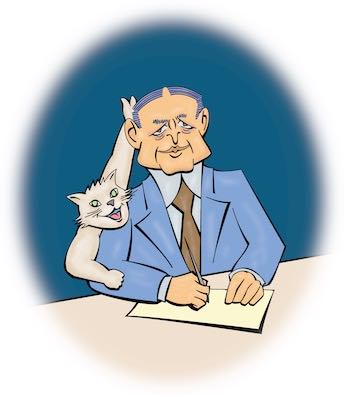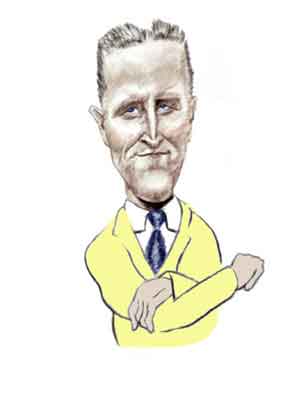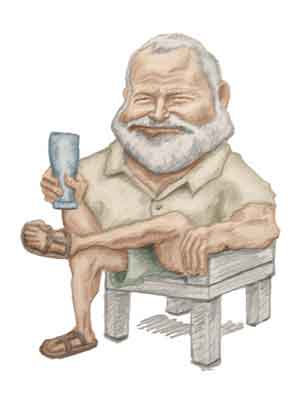T. S. Eliot

No, "T. S. Eliot" isn't what the friends of Eliot Ness told him when he lost Cleveland's 1947 mayoral election. This is the poet, Thomas Stearns Eliot.
By far Tom (as his friends called him) is most famous for his poem The Waste Land. The poem is lengthy, over 440 lines, but it was considerably longer before Tom's friend and fellow poet, Ezra Pound, helped pare the verses down.
With such an extended composition, it's no surprise that most people only remember the first line:
April is the cruelest month ...
... from which you can guess the poem is not of the most cheery and bubbly of poetic tomes.
The Waste Land1 deals with the life and people in Europe immediately following the First World War. It is divided up into sections where individuals voice their thoughts. Their despairing outlooks may come as a surprise to those whose knowledge of post-War Europe is from stories of the American ex-patriates living in Paris - the somewhat misnamed "Lost Generation". It certainly seems odd that a group of people who spent their time skiing in the Alps and eating brioche and drinking coffee in the restaurants along the Seine could be so gloomy.
Footnote
Normally the title of a poem is in quotes. But The Waste Land although originally published in the magazine The Dial was later brought out as a separate book. So the italics - used for book titles - is appropriate.
But most people living in Europe were Europeans and didn't have the independent means and a strong currency that allowed the Americans to spend their time painting or writing or composing or funding literary magazines. By the 1918 Armistice, about 1 % of the European population - military and civilian - had died. In some countries where the fighting was most active, we find numbers like 3 - 5%.
In addition to the personal tragedies of the war, times were hard and economies were in shambles. In Germany the government collapsed into revolution and when it emerged as the Weimar Republic, the currency spiraled into such inflation that if you missed a streetcar on the way to the store, your money could be reduced by half or even a quarter of its value. By 1923 a glass of beer was running 5,000,000 marks and the government was issuing new bills by adding zeros to old banknotes. Naturally the havoc created spilled over to the neighboring countries who found it impossible to collect debt payments owed by Germany.
The Waste Land was written in those immediate post-war years and it was printed in 1922. Although a "modernist" poet, Tom was nevertheless well-versed in classical literature, and you can find similarities in his lines like:
The Chair she sat in, like a burnished throne,
Glowed on the marble ...
... with some guy named Will:
The barge she sat in, like a burnish'd throne,
Burn'd on the water ...
Although Tom was born and raised in St. Louis, his family originally hailed from New England. They were fairly well-to-do and Tom graduated with a BA from Harvard in 1909. He continued his studies for a Ph. D. in Boston and Europe, but while he was in Europe the war broke out and he never completed his degree.
During the war Tom lived in London and he settled in Paris in the early 1920's. With his considerable literary credentials he had made friends with other literati. Among them was Tom's friend Ezra Pound, who was also an American and had crossed the pond to where living was cheap for those with American dollars. However, although Tom's family was fairly well set up, he didn't have a large inherited fortune (like a writer named Scott) or a wife's trust fund (like someone named Ernest). So he got jobs working as a teacher, news reporter, and bank clerk. He also reviewed books and worked as an editor.

Guys like Scott ...

... and Ernest.
The publication of The Waste Land established Tom as a poet and the poem won the prize awarded by The Dial. Although some may disparage such awards as a bunch of rich friends giving each other prizes, this isn't really correct. The Dial published a lot more than just works by the friends of the editors. In addition to Tom, the luminaries whose works appeared in The Dial are literally a who's who of early 20th century art and literature.
The Dial Award was substantial, a couple of thousand dollars which was enough to easily live on for a year. Tom was now recognized as a major literary figure and in 1925 his first volume of poems was published by the prestigious English publisher Faber and Faber. Shortly thereafter Tom became a member of the firm's editorial staff which if nothing else provided a steady income. Whether the acceptance of his poems by the British influenced his decision, in 1927, Tom became a British citizen and joined the Church of England. And whether he was born with it or not, somewhere along the line he picked up a British accent.
The consensus is that The Waste Land is one of the most important poems in the English language. However, the poem was not without criticism and some of it quite tough. The popular writer C. S. Lewis didn't like modern poetry in general and Tom's verse in particular. However, one of Jack's biographers hints his criticism may have been due in part to personal resentment toward a successful poet by one whose literary talent was definitely not poetry. On the other hand, if there's one literary genre that's easy enough to criticize, it's modern poetry.
It's a good bet that if you ask your average Joe and Josephine Blow on the street if they've heard of The Waste Land, they'll direct you to the nearest municipal landfill. On the other hand they may have heard something by T. S. Eliot. After all, it was Tom who provided the words for the 1981 Broadway hit, Cats. Based on Tom's 1939 book Old Possum's Book of Practical Cats, the show was one of the most popular musicals of the late 20th century and the original run in London lasted over 20 years.
References and Further Reading
T. S. Eliot: A Life, Peter Ackroyd, Simon and Shuster, 1985.
T.S. Eliot: An Imperfect Life, Lyndall Gordon, Norton, 1999.
"T.S. Eliot (1888-1965)", Biography, 2014, 2019.
"Timeline of T. S. Eliot", What the Thunder Said, Raymond Camden, January 1, 2021.
The Waste Land, T. S. Eliot, Boni and Liveright, 1922.
"The Waste Land", Encyclopedia Britannica.
"T.S. Eliot's 'The Waste Land'", Ten Great Writers of the Modern World, 1988.
"The Waste Land Summary", eNotes.
"The Odd Story of C.S. Lewis, an Extremely Odd Man", Andrew Wilson, The Daily Beast, March 10, 2013, (Updated: July 11, 2017).
The Tonight Show Starring Johnny Carson, February 20, 1975, Internet Movie Data Base.